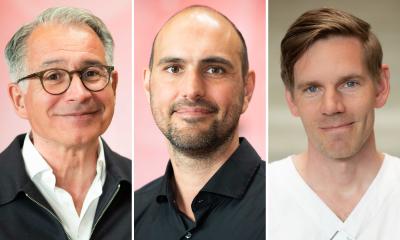Niklas Landberg, researcher at Lund University and physician at Skåne University Hospital
Image source: Lund University; photo: Tove Smeds
“Our discovery can partially explain why immunotherapies have thus far only had a limited effects in AML. It’s an important step forward, but continued research and clinical trials will be needed before it can be relevant as a treatment for a patient group that is in great need of new therapies,” says Niklas Landberg, research group leader at Lund University and medical registrar in hematology at Skåne University Hospital, and one of the researchers behind the study.
The study marks a step towards more individualised cancer therapy, in which the patient’s tumour can be attacked based on its unique characteristics and defences. The work on further development and testing of the antibody will continue, with an aim to establish future clinical trials.
The team behind the study has started a spin-off company, Lead Biologics, which is now driving the commercial development of the antibody as a future medicine.
The study was carried out with funding from, among others, the Swedish Childhood Cancer Fund, Swedish Cancer Society, Swedish Research Council, ALF funding, Knut and Alice Wallenberg Foundation, Mats Paulsson Foundation, Mrs. Berta Kamprad’s Cancer Foundation (L2CancerBridge grant at CREATE Health Cancer Center) and the Cancera Foundation.
Immunotherapy is a revolutionary treatment approach for different forms of cancer. Since approval was granted for the first checkpoint inhibitors, the research community has pursued answers to explain why many patients do not respond to their treatments – and how more tumours’ defence mechanisms can be broken down. New targets, such as the mechanism now discovered, pave the way for more accurate and effective immunotherapy.
Source: Lund University

